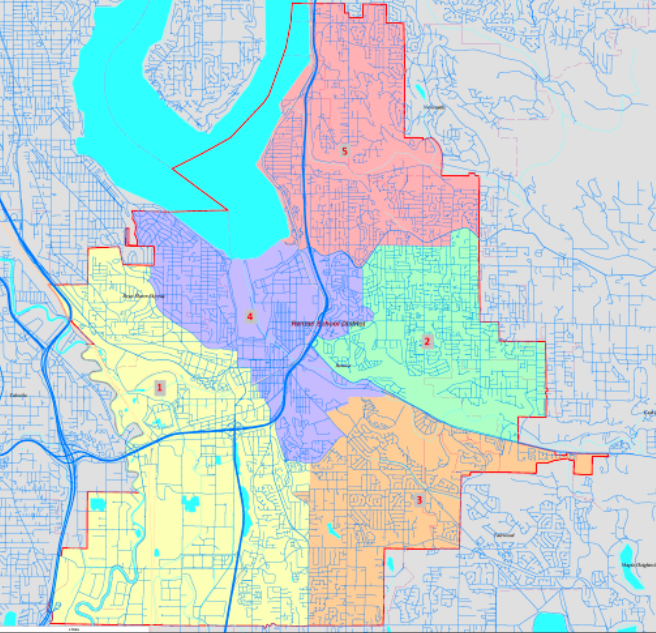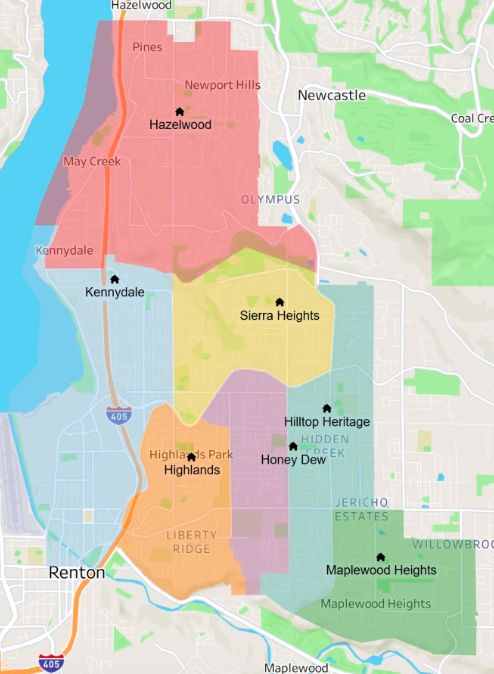Serving in any public office can be a hard job, and school board director can be one of the most difficult since the job is about people’s children. Renton school board directors do not get paid for their service. It’s important to keep this in mind when contentious issues arise. I’ve heard a petition is being circulated, so I thought people may want to know more about why.
While I was not personally in attendance at the Wednesday Renton School board meeting, some Renton parents say they were surprised by the quick 2-0 vote from a normally five member board that will set future elementary school boundaries.
Renton’s five-person school board is down to four members due to a resignation in January. One of the remaining members was unable to attend the March 8 meeting, putting the board in the position of meeting with only three members, the minimum allowed for a legal quorum. The lengthy agenda included an item that Renton parents have had their eyes on for months– the new school boundaries that will rebalance school attendance upon opening Renton’s new elementary school, Hilltop Heritage. While the new school is cause for celebration, rebalancing schools must be done thoughtfully because it can have ripple-down effects on hundreds of families beyond the new school. Many families are deeply committed to their local school, where they may have had sent multiple children and developed relationships, and they may have volunteered there for years. Some of them live within blocks of a school, and don’t want to start sending their child on a bus if they don’t have to. In an attempt to get in front of these concerns, the District had methodically convened staff/resident working committees to painstakingly develop several options, using as much data as they could bring to the table. Then they published alternative options maps, with three proposals for rebalancing, and asked for feedback. The proposals they considered can be found at these links: A, B, and C . They’ve been accepting input on these maps for weeks.
For such a systematic process, it seemed to end abruptly. When the time came for the board to vote on the preferred alternative, according to parents present, one school board director abstained indicating she felt further discussion and review were needed. Since only three out of five directors were in attendance, this left the final vote at 2-0 in favor of option A.
Some parents contacted me asking if a minority of school board members could legally make such a major decision for the district. While I am not a lawyer, I was able to find both Renton Board Rules and a state law RCW 23B.08.240 that indicate that when the quorum is met (3 members), then a majority of those present (2 members) are needed to pass a motion (unless its a motion that hires a new superintendent). So yes, my Robert’s Rules review says this was an allowed action by the board.
Is this how I would have handled the voting? No, unless there is some important backstory I’m not aware of. I’ve reached out to one of the board members to see if I can learn more. Since this is a major decision for the district and its families, the final decision ideally should have had the support of a majority of the school board even if not required by statute. There were many times on city council that we delayed major decisions for a week or two to ensure we had as many council members participate as possible. Delaying big decisions to have many members present is not just a courtesy to absent members, but important for maintaining public confidence. Unless there is something I don’t know of, the board could have considered waiting until they had four members present, or perhaps even better finished their appointment of a replacement member, and voted with five.
The problem of a small vote count is even more prickley for Renton school board than Renton City Council. While Renton council members are elected at large, the school board directors are “districted,” intentionally elected from five different geographic areas of the school district so that the whole school district receives relatively equal representation. Unfortunately, the three board positions that have students affected by this change in their subdistricts were the three that didn’t cast votes: the vacant director seat (4), the director who was absent (2), and the director who abstained (5). Neither of the two that voted to approve the plan (1 and 3) has affected students in their subdistrict.

School board directors are elected (or sometimes appointed) from five subdistricts in Renton. Directors in subdistricts 4, 5, and 2 have students that are impacted, and they did not vote; directors from 1 and 3 cast the only two votes, passing the realignment, even though neither of their subdistricts has students impacted by the change.
If all three members that were present had voted in the affirmative, the vote would have instilled more confidence, since three “Ayes” would represent a majority of the board. It still would not have been as good as waiting until there were four or five members in attendance, because deliberation and discussion by board members is part of the process.
There is also an open public meetings risk presented with just two or three directors voting. Under the open public meetings act all meetings with enough board members to take action need to be public, and meetings can include one-on-one chats where tentative decisions are discussed informally. With just three directors voting, if any director had discussed the issue privately with just one other director in advance, they could have unintentionally violated the spirit of the open public meetings act. Larger board turnouts help prevent this accidental pitfall.
Parents have asked me if the decision could be changed. I’m not weighing in on whether it should be changed or not, since I don’t have all the information. But the technical answer to the question is that under Robert’s Rules, a member that voted yes on the motion could ask for reconsideration of the motion at the next regularly scheduled meeting, although it would be very unusual for someone to do so if they were confident in their original vote.
At this point it is important for parents to find the School Board website including frequently asked questions, which explains among other details that kids going into fifth grade next year may stay at their current school if parents request it by an April 7 deadline. It will also be important for the School District to communicate to the public why they picked the option they did, and how they addressed and dispositioned the vast number of comments they received during the process, to give parents confidence they were listened to. I would personally encourage the district to develop additional policies to work with families and perhaps whole neighborhood pockets that have been committed to their specific schools for a long time. Hopefully this is already in-work.




I completely agree that it would have instilled more confidence to have tabled the voting until more impacted members could be present to challenge the proposal. It was very concerning to not have more discussions occurring prior to just voting to approve option A. I hope in the future that there are more public meetings discussing such impactful changes.
One would think that they needed a larger group to take such considering what is going onto the North of us. Granted Renton is not closing any schools, but a border realignment is going to cause a fuss.
Yes, a majority of two is all that is required with a quorum of 3, but something that will have such an effect on a large area should require a majority of a full quorum. Plus, I would wonder about the reason for the abstain to vote. Did that person feel there should be more voting or was there a possible conflict?
I was at the meeting and I believe director Scovel thought there should be more discussion before a decision, so she abstained.
Both of my daughters will be impacted by this change. Especially galling is knowing that they’ll be yanked from the friendships they make in their new elementary school and then later stuffed into a completely different middle school from the rest their new friends.
Seems like this change was rushed at the expense of hearing from those in the community who would be affected.
Bit of trivia: If the third member didn’t announce their vote yea/nay/abstain then they may not have counted for a quorum. Typically when that happens, the president will do another roll call and the member could remain silent when their name is announced and would be out of the meeting. Often you need the opinion of a parliamentarian to sort it out.
You raise a very interesting topic Internet Rando, and it got me searching online forums to see how such a situation might go. Interestingly I came across a whole debate by parliamentarians on the Robert’s Rules of order forum about what happens if a member does something more dramatic, and walks out to break quorum when a vote is called. Just as you say about going silent, it would take a parliamentarian to sort it out, and just like lawyers each parliamentarian has multiple opinions. In this link I’m attaching, a commenter named Sean Hall explains that if the walkout occured after the vote was called for, he would treat it the same as an abstention, but then call an end to the quorum for future topics. Others said the results would be different with a voice vote. Still others pointed that someone in attendance would have to raise the point of order that they no longer had a quorum for the lack of quorum to be noted and acted on. I should add that I think no one could fault the School Board Director who abstained because she felt she needed more information. I rarely abstained on council, usually voting no if I felt I didn’t have the information I needed, but voting no would not have led to any difference in outcome in this school board case. Going silent or walking out potentially might have, but that would have been a move I have not personally seen done before, and technically might break board rules.
https://robertsrules.forumflash.com/topic/13532-vote-called-then-quorum-is-broken-may-vote-proceed/
To solicit feedback from the community and then address exactly none of it publicly is appalling. This is a change that will affect hundreds, if not thousands of students.
It seemed like Option B and C were never true possibilities since there was zero public discussion (besides director Scovel’s questions, which I appreciate) before moving to approve option A. This is deeply unfair to the community and not at all transparent. To me, it feels like it was rubber stamped behind closed doors and the opinions of anyone not on the boundary committee was not taken into account.
I made a public comment at the board meeting on Feb 8, tried to speak with Director Scovel, and submitted feedback through the Google form as directed. And none of it was addressed, I was told “we don’t have to respond to public comments” and “just put your feedback in the Google form”.
Now my kids will go to a school that is outside of our community and they’re zoned for a different middle school than the rest of their elementary school. I am deeply dismayed at how this was handled and how the community was listened to (or, not listened to in this case).